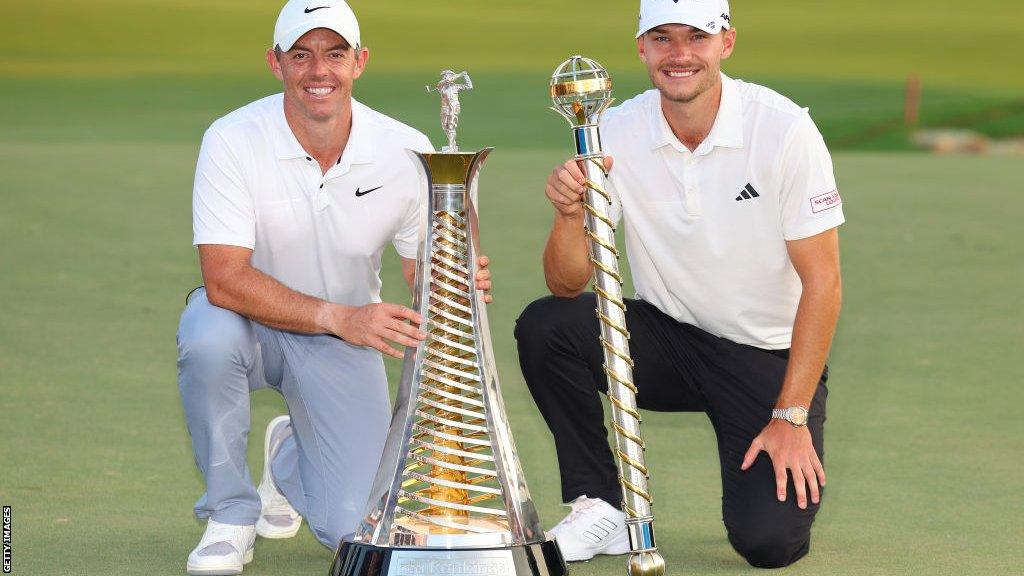DP World Tour winner Nicolai Hojgaard crestfallen as twin brother Rasmus misses PGA Tour card
- Published
- comments

Rory McIlroy had already won his fifth Race to Dubai title before Nicolai Hojgaard won the DP World Tour Championship
Nicolai Hojgaard's mixed emotions summed it up, reminding us why we become invested in professional golf.
How efficiently these guys get the ball into the hole changes lives and in a sporting context it really matters.
On one hand Hojgaard could celebrate the biggest win of his career. His dramatic two-shot victory at the DP World Tour Championship was worth a cool $3m (£2.4m). There was an additional $1.2m bonus for finishing second in the season-long Race to Dubai.
He was already looking forward to membership of the PGA Tour, but the overriding dream of taking on the US in tandem with his twin brother Rasmus lay in tatters.
While Nicolai's closing 64 eclipsed the challenges of Ryder Cup team-mates Tommy Fleetwood and Viktor Hovland, as well as Englishman Matt Wallace, a closing 69 in Dubai for Rasmus fell a fraction short of what was needed.
A visit to the water on the 18th capped a frustrating final round and he finished 11th. Frenchman Matthieu Pavon, meanwhile, birdied the last four holes to claim a share of fifth place in the tournament.
And that was enough for the man from Toulouse to snatch one of the 10 PGA Tour cards available to those, who unlike Nicolai, had not already sewn up US playing privileges for 2024.
Rasmus had started the week in 10th position on that mini table and was edged out of joining the likes of Scotland's Bob MacIntyre and Poland's Adrian Meronk in graduating to the biggest and best circuit in world golf.
"I really wanted him to get that card," Nicolai said of his crestfallen twin. "He was in a great position. He's playing good golf. It came down to a crazy scenario in the end.
"You know, I feel sorry for Ras but he's going to bounce back. He always does. He's one of the best golfers I know and he's going to come back stronger afterwards."
There is plenty of evidence to suggest that will be the case. This remarkable pair of 22-year-old Danes have inspired each other throughout their young careers.
Rasmus already has four DP World Tour wins, this was Nicolai's third triumph on the European circuit.
Last Sunday's winner made his Ryder Cup debut in Rome this autumn, he is now within touching distance of ending the year in the world's top 50 and that would mean a Masters debut next April.
Rasmus, meanwhile, has to content himself with continuing to build his future on the DP World Tour.
This was the first season where 10 PGA Tour cards were up for grabs. For many critics, this development enshrines the European-based circuit as a mere 'feeder' tour.
But in reality it formalises what has been happening for years. Whether 10 cards is too big a carrot can be argued, but the fact is the arrangement brings a competitive edge that helped increase the significance of last week's tournament.
The Race to Dubai had already been won by Rory McIlroy, but the added dimension of potential graduation brought its own fascination in the way of most promotion/relegation battles.
With the future of the men's professional game in such a state of flux, whatever is hammered out for the future will surely have to take account of the dimension that was at play in the desert last week.
Investors, apparently, queuing to pour money into golf would surely imagine a world tour scenario based on a meritocracy where player performance determines who competes on the biggest tours.
PGA Tour commissioner Jay Monahan, who also sits on the board of the European tour, was an interested spectator in Dubai last week. He sees merit in a worldwide circuit and maybe we are finally inching towards the concept becoming reality.
Imagine a global tour, one that properly ventures beyond the confines of the United States, with feeder tours around the globe. Promotion and relegation would be a central element, just as it was in the United Arab Emirates last week.
Whatever comes out of the ongoing negotiations between the tours, Saudi Arabia and other investors, competitive integrity with its attendant agony and ecstasy must surely be central to the package.
For every triumph there needs to be despair. It is why we care. Just ask the Hojgaards.
